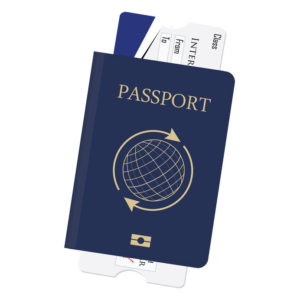IRS to Revoke U.S. Passports

The IRS will soon begin to revoke the passports of U.S. citizens under a law signed by Barrack Obama in 2015.
The Fast Act
On December 4, 2015, Barrack Obama signed the “Fast Act” into law. The law is designed to fix America’s
transportation systems. Tucked away in the Fast Act is a provision that directs the U.S. State Department to revoke the passports of U.S. citizens, if the IRS certifies that the citizen owes more than $50,000 to the IRS in back taxes. It also directs to the State Department to deny an application for a U.S. passport if the IRS certifies that the applicant owes more than $50,000 in back taxes.
However, the IRS will generally not certify such action to the State Department if the taxpayer has entered into a payment plan with the IRS and the taxpayer is not in default of such plan, or if the IRS has suspended collection because of a pending due process hearing about the amount owed.
The Fast Act requires the IRS to notify the taxpayer of a certification at the same time that it notifies the State Department of the certification. According to IRS.gov, the State Department will permit the taxpayer up to 90 days to resolve the debt before it denies an application for a passport. However, IRS.gov states that the State Department will provide no such grace period before it revokes a passport. If the taxpayer is outside of the U.S. when the State Department revokes the passport, the State Department may permit the passport to be used for the sole purpose of reentering the U.S.
After receiving notification of certification from the IRS, a taxpayer may then file a civil action against the United States with the Tax Court or with a U.S. district court for review as to whether the certification by the IRS was proper.
The Real ID Act
The Fast Act does not affect travel only outside of the U.S. It could also affect travel inside the U.S. In 2005, the U.S. Congress enacted “The Real ID Act”. The Act requires each state to collect certain information about their citizens in connection with the issuance of a driver’s license. Beginning on January 22, 2018, a driver’s license issued from a state that has not complied with the Real ID Act will not be accepted as valid identification for air travel within the United States. (In fact, soon no federal agency will accept a driver’s license issued by a noncompliant state as valid ID.)
Five states have failed to comply with the Real ID Act: Washington, Montana, Minnesota, Maine, and Missouri. Nineteen other states have been granted extensions to comply with the Act. The extensions granted to seven of those states will end on June 6, 2017, and the extensions granted to the other 12 states will end on October 10, 2017. (See the map.)
Travelers with a noncompliant driver’s license will have to present some other form of identification in order to travel by air in the United States. A U.S. passport is one form of acceptable identification. So, if you live in a state that has not complied with the Real ID Act, or that has been granted an extension, now is a good time to apply for a passport, or to renew an expired one. But time is of the essence. The State Department may soon stop accepting driver’s licenses as valid identification of applicants from states that have not complied with the Real ID Act. The State Department, in that circumstance, will accept other forms of identification, but it may be difficult or impossible for some applicants to obtain the other forms.
Finally, if your passport is revoked because you owe more than $50,000 in back taxes to the IRS, and you’re from a state that has not complied with the Real ID Act, beginning in January you can use neither a passport nor your driver’s license as identification for commercial air travel within the U.S. The TSA does accept other forms of identification. The problem is that most natural born Americans don’t have, and cannot get, the alternative forms of identification.
Conclusion
The Fast Act will prevent many U.S. citizens from travelling outside of the United States. The Fast Act and the Real ID Act together could even prevent many U.S. citizens from flying inside the United States. Now that’s a travel ban worth protesting.
Michael Sewell, JD, MBA helps individuals manage and protect their personal and business assets with business entity formations, trusts, civil litigation, self-directed IRAs, tax strategies, private securities, and more.
Please contact Michael Sewell for an initial consultation at no charge. (314) 942-3232 | michael@sewelllaw.net.
This article is for general informational purposes only. This information is not intended as legal advice. You should consult an attorney regarding how this information might apply to your specific circumstances.
The choice of a lawyer is an important decision and should not be based solely upon advertisements.
© 2016 Sewell Law, LC; published February 20, 2017.


